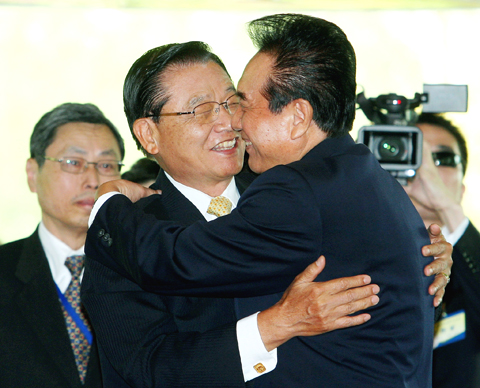Straits Exchange Foundation (SEF) Chairman Chiang Pin-kung (江丙坤), the nation’s chief negotiator with China, arrived in Nanjing, China, yesterday morning on a mission to seal three agreements and one joint statement with China.
The highlight of Chiang’s visit will be a meeting today with his Chinese counterpart, Association for Relations Across the Taiwan Strait Chairman Chen Yunlin (陳雲林).
The two sides are expected to sign three agreements on the launch of regular cross-strait passenger flights, financial cooperation and mutual judicial assistance and cross-strait cooperation to fight crime. Any consensus reached on opening Taiwan to Chinese investment would be covered in a joint statement.

PHOTO: CNA
Representatives of the SEF and ARATS held a preparatory meeting yesterday to finalize the text of the agreements and the joint statement.
Mainland Affairs Council Chairwoman Lai Shin-yuan (賴幸媛), who was at Taiwan Taoyuan International Airport to see off Chiang and his delegation, promised that the SEF’s negotiations with ARATS would be conducted in accordance with the principles of equality and dignity and would uphold the interests of Taiwan and its people.
During the talks, Chiang is also likely to raise a proposal for Taiwan and China to sign an economic cooperation framework agreement (ECFA) as instructed by President Ma Ying-jeou (馬英九) during their meeting on Friday.
Ma has argued that if Taiwan does not sign such an agreement with China, it risks being marginalized and losing its competitiveness because China and neighboring countries are planning to sign free-trade agreements.
Critics, however, warned that the ECFA could jeopardize Taiwan’s sovereignty and make it too economically dependent on China.
Defining the ECFA as an accord about “tariff reduction” and “fair trade,” Lai yesterday said it was essential to normalizing cross-strait trade.
Addressing concerns about the negative impact of the ECFA on local businesses, Lai said in an interview with a radio station in Taichung yesterday that there would be supplementary measures in place and that the government would only open industries that could benefit from and attract Chinese investment.
They will not include industries involved in high-tech development or national security, she said.
A pact on judicial assistance and cooperation to fight crime will allow for the repatriation of Taiwanese fugitives in China to face justice, she said. Of the 85 major Taiwanese economic criminals who have fled to China over the past 10 years, only one has been returned to Taiwan, she said.
Lai said the two sides would also discuss “fifth freedom of the air,” or the right of airlines to operate connecting flights, during the Chiang-Chen meeting, but it would not be the focus of the meeting because of its technical complexity.
Fifth freedom of the air means that an airline can carry passengers from one country to another, and then on to a third country. Beijing has been reluctant to discuss the matter because it touches on the issue of sovereignty.
Also See: Financial deal is ‘ticket’ to Chinese market: FSC head

AGING: As of last month, people aged 65 or older accounted for 20.06 percent of the total population and the number of couples who got married fell by 18,685 from 2024 Taiwan has surpassed South Korea as the country least willing to have children, with an annual crude birthrate of 4.62 per 1,000 people, Ministry of the Interior data showed yesterday. The nation was previously ranked the second-lowest country in terms of total fertility rate, or the average number of children a woman has in her lifetime. However, South Korea’s fertility rate began to recover from 2023, with total fertility rate rising from 0.72 and estimated to reach 0.82 to 0.85 by last year, and the crude birthrate projected at 6.7 per 1,000 people. Japan’s crude birthrate was projected to fall below six,

US President Donald Trump in an interview with the New York Times published on Thursday said that “it’s up to” Chinese President Xi Jinping (習近平) what China does on Taiwan, but that he would be “very unhappy” with a change in the “status quo.” “He [Xi] considers it to be a part of China, and that’s up to him what he’s going to be doing, but I’ve expressed to him that I would be very unhappy if he did that, and I don’t think he’ll do that. I hope he doesn’t do that,” Trump said. Trump made the comments in the context

SELF-DEFENSE: Tokyo has accelerated its spending goal and its defense minister said the nation needs to discuss whether it should develop nuclear-powered submarines China is ramping up objections to what it sees as Japan’s desire to acquire nuclear weapons, despite Tokyo’s longstanding renunciation of such arms, deepening another fissure in the two neighbors’ increasingly tense ties. In what appears to be a concerted effort, China’s foreign and defense ministries issued statements on Thursday condemning alleged remilitarism efforts by Tokyo. The remarks came as two of the country’s top think tanks jointly issued a 29-page report framing actions by “right-wing forces” in Japan as posing a “serious threat” to world peace. While that report did not define “right-wing forces,” the Chinese Ministry of Foreign Affairs was

PREPAREDNESS: Given the difficulty of importing ammunition during wartime, the Ministry of National Defense said it would prioritize ‘coproduction’ partnerships A newly formed unit of the Marine Corps tasked with land-based security operations has recently replaced its aging, domestically produced rifles with more advanced, US-made M4A1 rifles, a source said yesterday. The unnamed source familiar with the matter said the First Security Battalion of the Marine Corps’ Air Defense and Base Guard Group has replaced its older T65K2 rifles, which have been in service since the late 1980s, with the newly received M4A1s. The source did not say exactly when the upgrade took place or how many M4A1s were issued to the battalion. The confirmation came after Chinese-language media reported